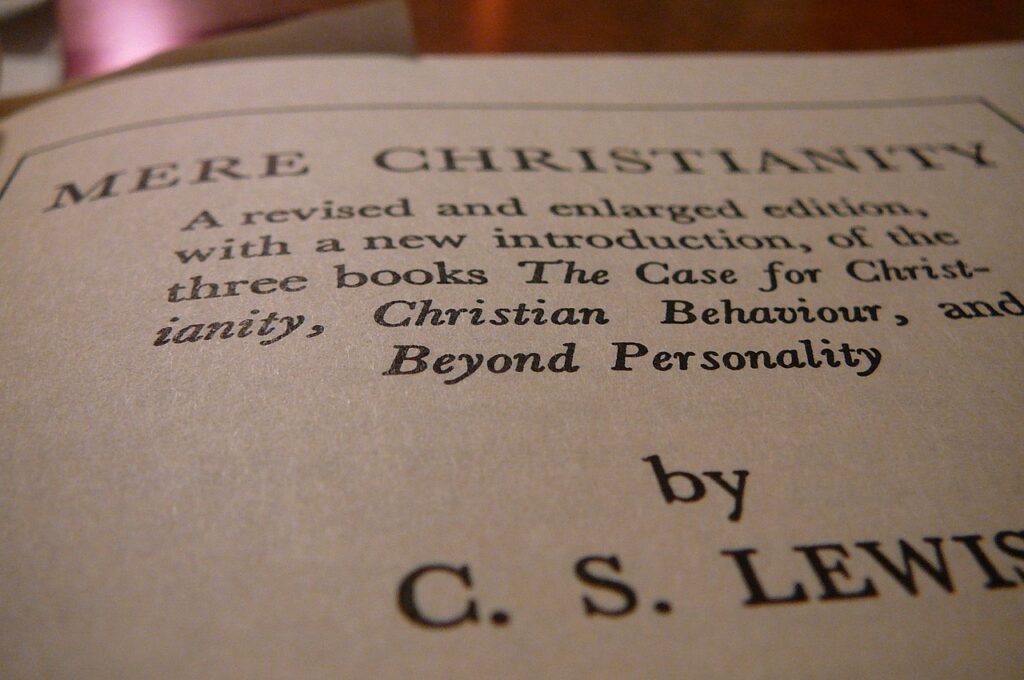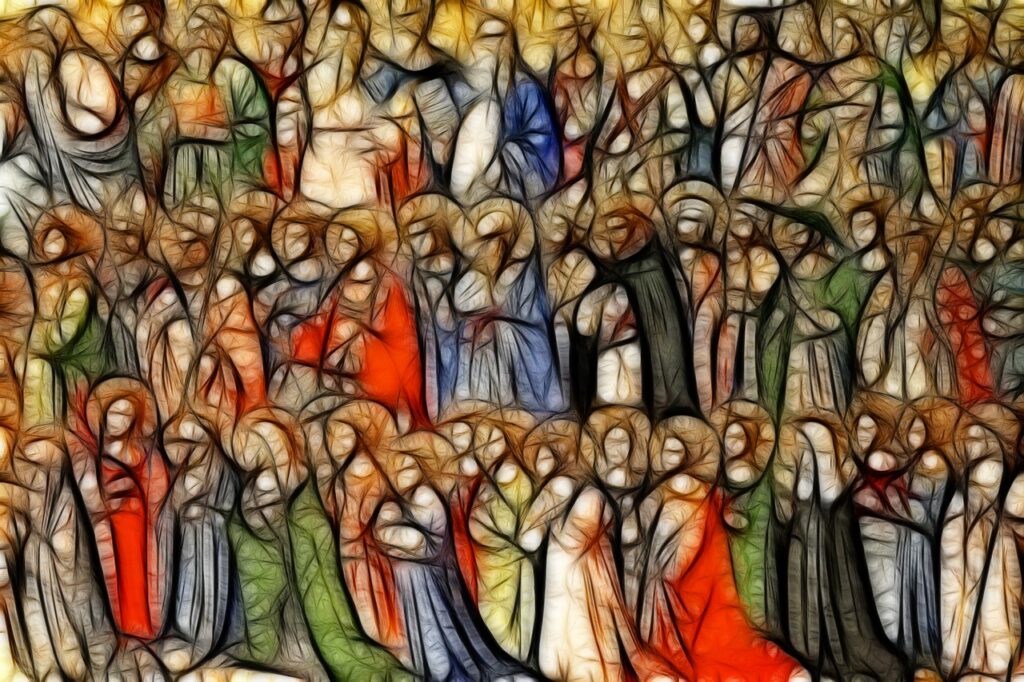I believe in Christianity as I believe that the sun has risen; not only because I see it, but because by it I see everything else ~ C.S. Lewis

My husband’s faith has never faltered—beer drinkin,’ salty language lovin,’ big brute that he is. At least, that’s what he reports the times I’ve asked. He claims he has always believed, not only in God, but in the deity of Jesus Christ. I’m not sure why his faith comes so easily. Maybe it’s in his DNA. He comes from a long line of Methodists.
Grappling with Faith
On the other hand, my faith has been hard won. I often recall a startling moment in sixth grade when it occurred to me the Bible story about Eve offering Adam the apple was suspiciously similar to the Greek myth about Pandora who opened that curious little box.
In both stories, each woman was the first of the gender to be created by God or the Gods. In turn, their creators put an object of great desire in their paths and warned them along with their husbands (Eve with Adam and Pandora with Epimetheus) not to fall to temptation. Adam and Eve were forbidden to eat the fruit from the tree of knowledge and Pandora was forbidden to open a beautiful box (or jar, in the ancient text) to which Epimetheus was given the key. As the stories go, curiosity got the best of both women and their disobedience is the sole reason that evil has free reign in this world.

A product of the era in which I was raised, I wasn’t phased by the fact that these stories depict women as foolish and impulsive and their men as innocent pawns in a forbidden act (it bothers me now, yes, but not then). What worried me was the possibility that the story of Adam and Eve I had been taught to embrace wholeheartedly as the truth–wasn’t true. After all, only a few short years earlier I had discovered that Santa Claus was a myth, a character key adults in my life seemed to take great pleasure convincing me was real.
When I questioned my mother about the peculiar similarity between Eve and Pandora, she quickly dismissed my worry with the firm, pat answer—bible stories are true and Greek mythology isn’t.
But, how could she be so sure, I wondered. I didn’t seem right to persist with my questions, so I let those first moments of doubt linger . . . and grow.
An Ironic Turning Point
Ironically, the strong faith I have today is the result of trying to convince myself there is no God, no Holy Spirit, and that Jesus Christ was merely a historical figure. The darkest passage of my life, was a six-week period of time in 1987 when I succeeded. With the help of a professor’s lectures in a graduate-level literature class, I arrived at the conclusion that God doesn’t exist. Nothing comes after the life we are given. This life is as good as it gets.
What followed in those six weeks was anguish, emptiness, anger, but mostly sadness. I sank into a frightening depth of despair that I had never before experienced because every decision I had made or had been made for me was within the frame of reference of Christian faith–the man I married, the joy of having children, being blessed with life’s necessities and a little more. What was the point of even living?
Then, one unusually warm night in November I had reached my lowest point. It was after midnight and I laid for a long while beside my husband who was deep in sleep. He had opened the window to let in some fresh autumn air before we crawled into bed that night. Although a slight breeze occasionally stirred the curtain sheers, outside the night was stock still. My mind was sick with hopelessness, too sad to cry. And finally, somewhere deep inside of me, I must have regressed to my childhood faith because a small voice cried out, “Please, God! Please help me!” At that moment, a strong wind swept through bedroom window, lifting the curtains high in the air. Instantly, I sensed the warmest comforting presence and a powerful voice welled up inside my head, “I am here. I have been here all along!”
The Conviction of Feeling Over Logic

In that simple instance, I remembered being a little girl, lying between my grandparents in their bed, snuggled up next to my grandmother when a gentle wind had lifted their bedroom curtains in the moonlight. I remembered her telling me then and many times later that God is with us always and everywhere and even in the wind. I remembered many moments when I had felt surrounded and safe, immersed in the presence of a power much bigger than me.
I felt silly then and even now that I ever doubted God’s existence. The older I grow, the more unshakable my faith becomes–(my reasoning surrounding some of the stories in the Old Testament is an ample subject for another article).
Like my husband, I can’t explain why I believe the way I do. I know millions of skeptics consider the presence of a higher power illogical. They view a half-human Jesus who rose from the dead nonsensical, and the idea that he died for our sins inconceivable. And that’s why over the years I’ve become an avid student of Christian apologetics–reasons and arguments supporting the whole Christian package.
Mere Christianity

I’m grateful, in particular, for the twentieth-century “voice” of C.S. Lewis (1898 – 1963). Once an atheist, Oxford University professor Clive Staple Lewis’s rationale for the Christian perspective of God’s existence makes sense. His BBC broadcasts in the 1940s are captured in the publication of Mere Christianity in 1952, one of our modern era’s most influential books.
In this work, Lewis introduces the concept of dualism–the undeniable existence of the dual forces of good and bad. That is, all good in our world has its evil parallel. And, within this framework are moral laws that appear to be intrinsically accepted as they govern behavior in every culture through the ages—essentially every civilization, past or present, has a system of punishments for crimes. This universal practice, in turn, establishes lines between appropriate and inappropriate behavior for all humankind, regardless of our language, creed, or race. No matter the society of which we are a part, most of us seem to distinguish between good and wrongdoing. From Confucious to Gandhi to Mother Teresa, we laud those leaders who enhanced the lives of others with their virtue. In contrast, we condemn those like Genghis Khan, Hitler, and Pol Pot for their deplorable cruelty.
Now, if you have followed me to this point, and agree that every culture seems to have clearly defined lines between what is right and what is wrong, then here is Lewis’s fundamental rationale that God exists: Lewis explains that in order for us to embrace the concept of good and evil, there must be an ideal standard established, a higher power that helps us intrinsically measure how good something is or how evil something is. And, Lewis argues, this standard or power is God: “My argument against God was that the universe seemed so cruel and un-just,” he writes. “But how had I got this idea of just and unjust? A man does not call a line crooked unless he has some idea of a straight line. What was I comparing this universe with when I called it unjust?”(Mere Christianity 25).
Lewis’s Argument Against Atheism

With this premise in place, Lewis reasons why the atheism he once embraced no longer seemed logical: “Consequently atheism turns out to be too simple,” he writes. “If the whole universe has no meaning, we should never have found out that it has no meaning: just as, if there were no light in the universe and therefore no creatures with eyes, we should never know it was dark, dark would be without meaning” (Mere Christianity 26).
In another instance in which Lewis presents his case for God’s existence, he argues that our longing and hope for perfect contentment or happiness more than suggests that a source of that perfect contentment or happiness must exist—and that source must be God. “Creatures are not born with desires unless satisfaction for those desires exists,” he writes (Mere Christianity 75). “A baby feels hunger: well, there is such a thing as food. A duckling wants to swim: well, there is such a thing as water. Men feel sexual desire: well, there is such a thing as sex.” However, regardless of our lot in life it seems an innate quality of human nature that we yearn for more. To this, Lewis surmises, “If a desire which no experience in this world can satisfy, the most probable explanation is that I was made for another world” (Mere Christianity 75).
But where does the deity of Jesus Christ come into the play in Lewis’s rationale?
If we can accept the idea that God is the universal power who determines right and wrong and good and bad, then we can surely accept that God is communicating with us as humans when we grasp the difference between good and bad and right and wrong. Lewis writes, “[God] lends us a little of His reasoning powers and that is how we think: He puts a little of His love into us and that is how we love one another” (35).
And if we can accept that God communicates with us as humans, why would it be difficult to accept that God embodied human form?
“Supposing God became a man — suppose our human nature which can suffer and die was amalgamated with God’s nature in one person — then that person could help us,” Lewis contends. “He could surrender His will, and suffer and die, because He was man; and He could do it perfectly because He was God. You and I can go through this process only if God does it in us; but God can do it only if He becomes man. Our attempts at this dying will succeed only if we men share in God’s dying, just as our thinking can succeed only because it is a drop out of the ocean of His intelligence: but we cannot share God’s dying unless God dies; and He cannot die except by being a man” (Mere Christianity 35).
In the closing pages of the book, Lewis concludes, “perhaps the most important difference between Christianity and all other religions: that in Christianity God is not a static thing — not even a person — but a dynamic, pulsating activity, a life, almost a kind of drama. Almost, if you will not think me irreverent, a kind of dance” (Mere Christianity 95).
More recently, I’ve come to the conclusion that it is pointless to argue about Christ’s deity, let alone the existence of a God who cares for us on an intimate level and guides us through the day–it all hinges on the degree of an individual’s faith. As Paul writes in his letter to the Hebrews, “now faith is the assurance of things hoped for, the conviction of things not seen . . . and without faith it is impossible to please him, for whoever would draw near to God must believe that he exists and that he rewards those who seek him” (Hebrews 11: 1, 6).
Escape from that Dark and Daunting Wasteland

For six long weeks, I abandoned that faith and experienced the dark and daunting alternative–living in an empty and wretched wasteland in the company of those too sophisticated to believe in something they can’t see or explain. Ironically, it’s my faith that rescued me from that existence.
I pity those who aren’t brave or imaginative enough to embrace the probability that an extraordinary supernatural presence surrounds us. This presence set our world in motion long ago, giving us all the freedom to act as we choose–including the freedom to choose this unique power’s intervention in our lives. As I grow older, I have experienced this “dynamic, pulsating activity” in my life many times and on a near-daily basis and I have come to recognize this power–this “drama” or “dance” central to my well-being, as the very presence of a very real God.
Lewis, C. S. Mere Christianity: Broadcast Talks. (1952). Samizdat. Retrieved on July 10, 2019 from http://www.samizdat.qc.ca/vc/pdfs/MereChristianity_CSL.pdf
